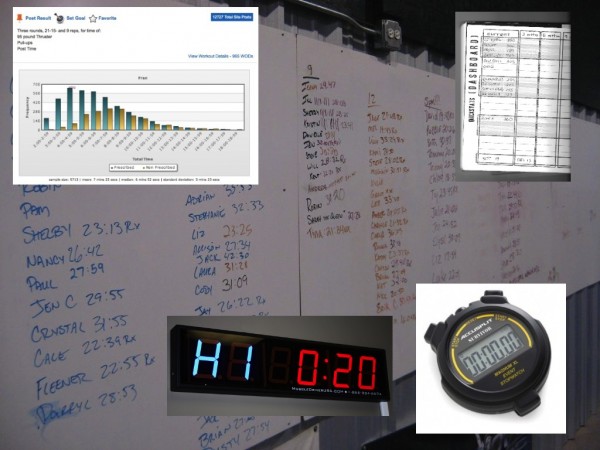Rest Day
I know this post is a bit wordy, but give it some thought then head out for an active Sunday.

In CrossFit we utilize measurable and repeatable data to track our workouts and to motivate us to work harder. Timers and stopwatches, whiteboards and journaling are part of our routine. The measurability factor of our workouts is a very powerful tool, but when counting reps and beating our friends becomes too important to us, it can hinder our progress. Over the last 6 years I have noticed several times that people’s intensity has suffered in various ways when they were overly concerned with their score on a WOD rather than being focused on hitting the WOD hard.
There are a few ways I have witnessed people’s workout intensity take a hit due to over emphasizing scores or times. The first is when people “game” or strategize a WOD by going easy on certain exercises to go faster on others. An example of this would be when I got my fastest time on Jackie (1000m row 50 thruster 30 pull up) by rowing the slowest 1000m time I have every rowed on the WOD. By saving energy on the rower I found myself able to go much faster on the next two exercises and get a much better overall time.
The argument over gaming WODs vs. just going hard throughout the WOD is as old as CrossFit. I have often seen people “game” WODs in our gym resulting in an overall lower intensity WOD even though they may have gotten a better score. I am guilty of this myself on a number of occasions including. Another obvious example is when I dog it on wall balls, sumo high pulls, and box jumps to rack up for 60+ push presses per round on Fight Gone Bad. The question you need to ask is if you are trying to get the best fitness benefit from your WOD or are you trying to win? Remember that winning doesn’t always yield the best stimulus for fitness adaptations, that is weight loss, strength gain, etc. If you are competing, by all means game your WOD to win the competition. If you are training to get in better shape, why not just go hard and stop worrying about strategy? Save the gaming for competition day, and keep in mind that it may be beneficial at times during training for a competitive athlete to play around with gaming since it will be important to competing successfully.
Another way I see the score obsession factor negatively effect a workout intensity is when people get too wrapped up in counting reps and keeping score. Last week we did a rotating Tabata between the AirDyne, pull ups and DB push press. You had 20 seconds to do each exercise and 10 seconds to rotate to the next. It’s a fast paced WOD without time for doing anything but exercising hard and fast. What I witnessed was more like 15 seconds work and 15 seconds rest or even worse than that. People were all worried about writing down how many calories and reps they got on each round and ended up resting 30-50% more than what the workout called for. Why? So you can write a crappy score on the board and in your journal. Those who just did the WOD without worrying about their score were more likely to rotate on time, go hard the whole time, perform higher quality reps, and do a shit ton more work that those who were busy writing down scores and trying to subtract the last persons AirDyne calories from their own.
It’s OK if you don’t count and score every WOD. After all, it’s not about counting, it’s about fitness. Have we every done that rotating Tabata WOD before? Do you think we will ever do that exact thing again? No. There’s nothing to compare it to and there never will be. So why bother wasting time to write down exactly what you did when you only had 10 seconds to get to the next thing and only 20 seconds to perform that task?
The worst possible thing I see, yes I see it and no you can’t hide, is short range of motion or just plain cheating. I am sure it is frustrating to see your peers blowing you out of the water on wall balls. So what do you do? Do you just squat half way down, count missed reps, and then shave a few reps off each set? No one will notice right? Wrong! Your coaches see it, and the person right next to you who is doing all of their reps correctly sees it too. Cheating range of motion and shaving reps is weak sauce, and if you do it, you will likely never catch up to the people who completed their WOD correctly. If the workout is too hard for you, scaling is the correct answer, not cheating. Always remember that you can only cheat yourself. You cannot cheat the honest hard working people around you, because at the end of the WOD the only prize is own personal satisfaction. If you are satisfied with your cheated reps and phony score, you don’t belong here, go find yourself a boot camp program.
To sum this up, remember that your intensity and integrity are more important than your score on the board. We come here to work hard and better ourselves and participate in a community of like minded individuals who share common goals. Using timers, whiteboards and journals are powerful tools when they increase your motivation and intensity. If using these tools works against the integrity of your movements or lowers your intensity, forget about scoring, go hard, and focus on making quality movements. Also keep in mind there’s this little thing every year called the CrossFit Open where you will have a judge holding you accountable. For those who put BS scores on the whiteboard throughout the year, the truth about their abilities shall reign down on them like stones on a tin roof.
Don’t game training WODs unless your intentions are to practice gaming. Go hard. Forget about score keeping when it hinders your output. Have integrity.





